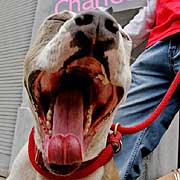|
|
Classifieds: Cars |
|
| Jobs |
|
| Dating |
|
| USA TODAY |
|
| |||||||||||||||||||||||||||||||||||||||||||||||||||||||||||||||||||||||||||||||||||||||||||||||||||||||||||||||||||||||||||||||||||||||||||||||||
|
| |||||||||||||||||||||||||||||||||||||||||||||||||||||||||||||||||||||||||||||||||||||||||||||||||||||||||||||||||||||||||||||||||||||||||||||||||
|
| |||||||||||||||||||||||||||||||||||||||||||||||||||||||||||||||||||||||||||||||||||||||||||||||||||||||||||||||||||||||||||||||||||||||||||||||||

| |||||||||||||||||||||||||||||||||||||||||||||||||||||
| |||||||||||||||||||||||||||||||||||||||||||||||||||||
DENVER (AP) — A few weeks ago, two police cars
and two animal control vehicles pulled up at the home of Stef'ny
Steffan looking for her beloved 4-year-old pit bull, Xena. Seven
officers hauled the animal off to the city shelter, putting her on
death row.
Xena became an outlaw after Denver won a court fight and reinstated one of the toughest pit-bull bans in the nation. Since May, more than 380 dogs have been impounded and at least 260 destroyed — an average of more than three a day. Dog owners are in a panic. Some are using an underground railroad of sorts, sending their pets to live elsewhere or hiding them from authorities. City officials would not estimate how many people might be violating the ordinance. Some owners, like Steffan, have won a reprieve for their pets with help from a rescue group. The group got Xena released by signing an affidavit stating that the animal would never return to Denver. The group took the dog to Mariah's Promise in Divide, an animal sanctuary that has accepted more than three dozen pit bulls from Denver. For Steffan and her partner, Gina Black, leaving Xena 60 miles from home was a lousy option but the only one they had. "It's safer than animal control. Safer than keeping her underground — at least she'll be able to play now," Steffan said. "But she'll miss us. We're her pack." Denver is one of three major metropolitan areas, along with Miami and Cincinnati, to ban pit bulls, according to Glen Bui, vice president of the American Canine Foundation. Pit bull typically describes three kinds of dogs — the American Pit Bull Terrier, American Staffordshire Terrier and the Staffordshire Bull Terrier. But Denver's ban applies to any dog that looks like a pit bull. The animal's actual behavior does not matter. City Councilman Charlie Brown said that in his judgment, "pit bulls are trained to attack. They're bred to do that." Critics of the ban use words like "annihilation" and "genocide," and the city shelter has received e-mails likening animal control officers to Nazis. "Breed bans are just a knee-jerk reaction to something that happened in the community," Bui said. Denver banned pit bulls in 1989 after dogs mauled a minister and killed a boy in separate attacks. The Legislature passed a law in 2004 that prohibited breed-specific bans, but the city sued and a judge ruled in April the law was an unconstitutional violation of local control. Critics of the ordinance say that a blanket ban on an entire breed is misguided that the law should instead target irresponsible owners and all dangerous dogs. "If anyone says one dog is more likely to kill — unless there's a study out there that I haven't seen — that's not based on scientific data," said Julie Gilchrist, a doctor at the federal Centers for Disease Control and Prevention who researches dog bites. The CDC, the American Veterinary Medical Association and the Humane Society of the United States examined 20 years of dog-bite data and concluded that pit bulls and Rottweilers caused the most deaths. But the researchers also noted that fatal attacks represent a small proportion of dog-bite injuries and that the number of bites per breed simply seems to rise with their popularity. At the city shelter, pit bulls are cordoned off from other dogs in what has become death row. Nearly 100 pit bulls have been released to live outside the county. A nonresident must guarantee the dog will never return to Denver. Sonya Dias, who is moving out of Denver because of the ban, said she was a little intimidated by her pit bull when she first saw him. But "when I said, 'Hey little doggie,' his whole body just started wagging." Gryffindor is staying at Mariah's Promise until Dias sells her home. "He's been dangerous to a couple of pairs of shoes and some mini-blinds," Dias said. "But otherwise he's a jewel." Copyright 2005 The Associated Press. All rights reserved. This material may not be published, broadcast, rewritten or redistributed. | |||||||||||||||||||||||||||||||||||||||||||||||||||||
